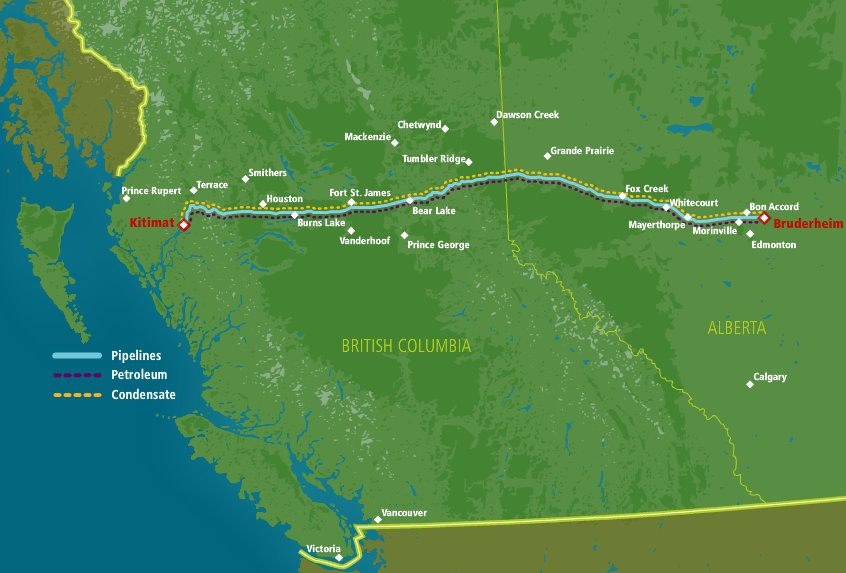Today, because events are moving so quickly, a twofer for you.
First, Premier Clark is in one hell of a jam and it’s scarcely improved with a man who I bet left the inner staff of Attila the Hun to join with Madam Photo-op by name of Ken Boessenkool, who amongst other clients worked as lobbyist for Enbridge for two years! What the hell reason could she give for this kind of move?
This woman is out of control. She’s in a political hotbox like President Gerry Ford was when he took over the mess Nixon left him. In fact she’s in a box Houdini couldn’t have escaped.
She’s trying to distance herself from the disgraceful reign of Gordon Campbell and now finds herself in the midst of the worst environmental fight probably in history. The proposed Enbridge Pipeline and resultant tanker traffic is straight from the Gordon Campbell/Fraser Institute playbook and it isn’t working out quite like the Liberal advisors had expected. In fact, Clark is facing, and knows she’s facing a political storm that makes Bill Vander Zalm’s troubles look like a kid’s fight in a sand box.
The trouble is, the public is onto them. It’s becoming clearer and clearer that a rupture or spill is inevitable and that the word “risk” has been replaced by “certainty”. Clark has this problem: the project only has the support of the “right” and the pretty far right at that. This problem wasn’t seen by the likes of Patrick Kinsella and other handlers – it’s called believing your own bullshit.
The NDP, and, of course the Greens have staked out the “no bloody way” voters and you might think well, so what’s the problem?
It’s called The Conservative Party and John Cummins. Without them, Clark might have been able to hold all the non NDP vote and been able to hold on. I doubt that because the government is in deep doo doo on so many fronts. With the Conservatives in the picture it’s Adrian Dix’s dream come true. Not only is their enemy divided but he has a good chance with the voter who perhaps doesn’t like anybody very much but tends to vote right rather than left.
If Ms. Clark were surrounded by happy campers, perhaps the Libs could hang on. The cold fact is that she only had one caucus member who supported her leadership and because he was given a cabinet seat – and then screwed up – she has a nest of adders in her caucus, many of whom will be looking at their own ridings and grasping at the life saver as they jump ship.
The pipeline/tanker issue has Clark buried. She knows it’s a terrible idea for the province and the people but can’t say so because she’ll lose her supporters.
She can’t say yes without jeopardizing her election chances.
She’s apparently without sufficient courage to say “no” and say “to hell with the right”, inside or outside the party, run on that stance then say, “Mr. Dix, we both agree on the pipeline/tanker issue now lets get down to the issue of which party should run this province.”
She doesn’t have the jam to do that so even the faint chance of a May 2013 victory is all but gone.
————————————————————————————————————————
Secondly, let us get some things straight for the times ahead – there will be leaks and spills from the pipeline and tankers no matter how much trouble Enbridge goes to avoid them. We’re being asked to commit environmental suicide – by Enbridge, the federal government and, by strong inference, Premier Clark.
My old and perhaps late friend, Bud Smith, says we cannot demand perfection. The trouble is, that is precisely what is demanded from Enbridge and its tanker clients because anything less will permanently damage the world’s last great rainforest – it cannot be remedied.
The route Enbridge’s pipelines would travel is for the most part inaccessible except by helicopter, meaning that even if there were measures to fix an oil spill (there aren’t) there is no way it could be handled (see map below).
 The proposed pipeline crosses several mountain ranges and nearly 1000 rivers and streams, including at least three major ones where hundreds of thousands of salmon spawn. This is a region which caribou, grizzly bears, other species of bear, including the rare Spirit Bear, deer and moose inhabit. It is, in short, an ecological treasure.
The proposed pipeline crosses several mountain ranges and nearly 1000 rivers and streams, including at least three major ones where hundreds of thousands of salmon spawn. This is a region which caribou, grizzly bears, other species of bear, including the rare Spirit Bear, deer and moose inhabit. It is, in short, an ecological treasure.
But let’s play along with Enbridge and let’s say that there is only a one in 100 chance of a leakage. Look at the map and see where that 1 in 100 is going to strike…are you going to gamble away our wilderness on these odds?
Forget about the environment for a moment and look at it as a cost-benefit analysis. Given that the leakage will come in a wilderness which will likely be only reachable by helicopter making any equipment for a clean-up out of the question, is the financial gain to BC worth this likely consequence?
This is a critical question, for the record is clear – you simply cannot clean up an oil spillage wherever it may occur.
The fact is, except for a few low paying white collar jobs there is no gain for BC. We are letting Enbridge use our wilderness to transfer Alberta’s toxic gunk to Kitimat to be shipped down our highly sensitive coast line to Asia and America. Does that sound like a good deal to you?
I don’t want to deal with economics here but simply the wilderness of the province of British Columbia.
We must understand that Enbridge has an unbelievably bad track record. Since 2002 their American subsidiaries alone racked up 170 leaks, and the company itself had a staggering 610 leaks from 1999-2008, including a 2007 explosion in Minnesota that killed two men and brought it $2.4 million in fines – this in addition to a 2003 gas pipeline explosion that killed 7 in Ontario. More recently there is the Kalamazoo River spill in July 2010 which will never be cleaned up.
I leave it thusly:
Is there any set of circumstances, other than an assurance of God Himself, under which you would approve any pipeline going through our precious wilderness?






